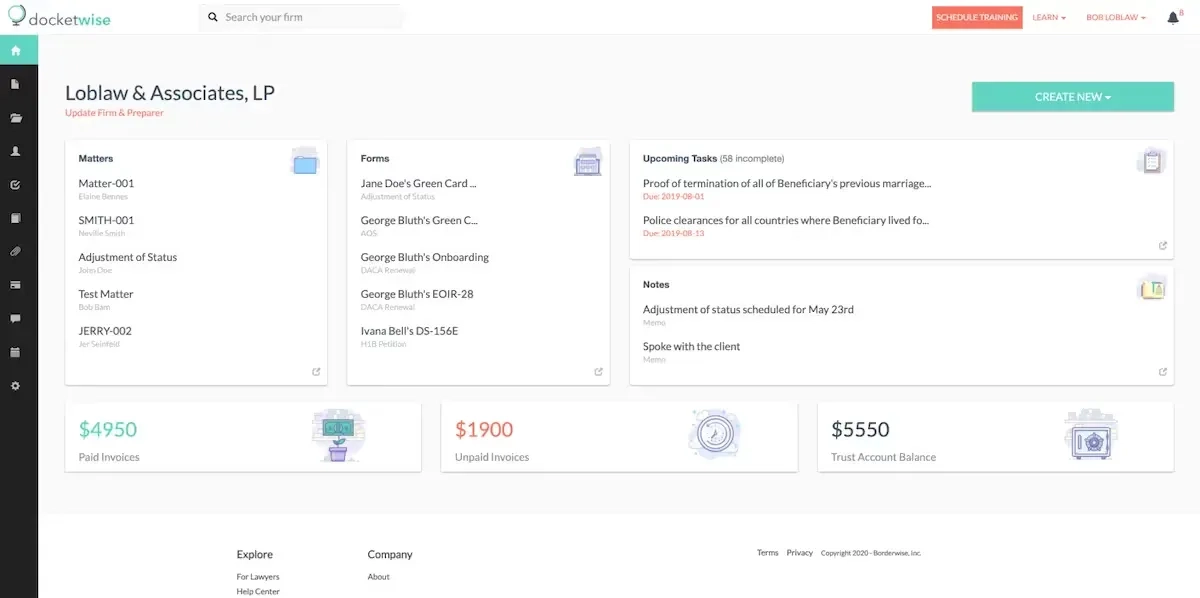In today's rapidly evolving and interconnected world, making the most out of data analytics has become a crucial tool for businesses and industries to gain insights, make informed decisions, and drive success. In the last decade, data analytics has become a driving force behind decision-making and innovation in numerous fields, including healthcare, finance, marketing, and beyond. That comes as no surprise, as the exponential growth of digital technologies and the proliferation of data sources have opened up vast opportunities to harness information for actionable insights.
Nonetheless, although the legal industry was one of the last industries that hopped on the tech-driven bandwagon, legal service practitioners are no longer the exception when it comes to using technology and data analytics for lawyers to propel their business forward. Data utilization makes everything much more straightforward and clear for lawyers, and no law field benefits more from this data analytics for lawyers trend than the immigration law industry.
As the immigration processes involve numerous documents, deadlines, and regulatory requirements, by harnessing the power of immigration data analytics, immigration practitioners can leverage the vast amount of data available to optimize their workflow, improve client representation, bump the levels of client satisfaction, and navigate the intricacies of immigration law more efficiently. In the following sections, we will delve deeper into the specific data types that should be collected in immigration practice and explore their importance in more detail.

Understanding The Types Of Data To Collect
Collecting and analyzing the right data types is the cornerstone of effective immigration data analytics in immigration practice. By understanding the specific data points to gather, immigration professionals can unlock valuable insights that drive informed decision-making, optimize processes, and improve client outcomes. In this section, we will delve into each data type, exploring its significance and why they are essential for enhancing your immigration practice.
Demographic Data
In the realm of immigration practice, understanding the demographics of your client base is paramount. After all, each client brings a unique set of circumstances, needs, and preferences.
Collecting and analyzing demographic data gives you valuable insights that enable you to tailor your services and provide a personalized experience for each client. Understanding client demographics goes beyond surface-level information; it helps you comprehend their backgrounds, cultural nuances, and specific challenges they may face during the immigration process.
When it comes to demographic immigration data, several vital factors warrant consideration. These include age, gender, nationality, and education level. Age provides insights into the different generational needs and expectations that existing and future clients may have. Gender considerations can sometimes help identify potential gender-based challenges or cultural concerns beforehand.

Nationality information is crucial for understanding specific immigration regulations and requirements for different countries. Education level can influence the complexity of legal processes, language proficiency, and opportunities sought in the destination country.
Analyzing demographic data brings a host of benefits to your legal practice. Firstly, it lets you identify legal industry trends and patterns within your client base. For example, you may notice increased immigration requests from a particular age group or nationality, enabling you to allocate resources and develop expertise in serving those clients more effectively.
Secondly, demographic data helps you tailor your communication and messaging to resonate with different demographics, ensuring clear and effective communication. Additionally, by understanding the educational background of your clients, you can gauge their familiarity with legal processes and provide appropriate, tailored guidance and support.
Tracking Case Progress Data
Maintaining comprehensive case records is crucial for running an efficient and organized immigration practice. Each immigration case involves numerous steps, documents, and deadlines. By tracking and recording the progress of each case, you create a reliable and accessible source of information that enables you to stay on top of each client's situation.
Furthermore, tracking critical milestones throughout the immigration process is essential for effective case management. These milestones typically include application submission, document management and processing, and decision outcomes. By diligently recording the dates and status updates for each milestone, you create a timeline of events that helps you monitor the case's progress. Tracking other relevant milestones, such as client interviews, medical exams, or visa interviews, provides a comprehensive overview of the case's development.

One of the significant advantages of tracking case progress immigration data is the ability to identify bottlenecks and areas for improvement in your workflow. By analyzing the data collected, you can identify patterns and delays that may hinder the timely progression of cases. For instance, you may discover that certain types of applications consistently face delays during document processing. This insight allows you to investigate the root causes of the bottlenecks, streamline processes, and allocate resources more effectively.
Furthermore, data analysis of case progress allows you to generate accurate and realistic estimates for clients regarding the expected timelines of their cases. This transparency fosters trust and enables clients to have realistic expectations. Additionally, by identifying areas of improvement and implementing changes based on data analysis, you can enhance client satisfaction as clients experience a smoother and more efficient immigration journey.
Analyzing Outcome Data
Analyzing case outcomes is critical to immigration data analytics in any immigration practice. Because, in the end, the ultimate goal of any immigration professional is to achieve positive results for their clients.
By analyzing case outcomes, practitioners can gain valuable insights into the effectiveness of their strategies, identify patterns, and make data-driven decisions to enhance client representation and improve overall success rates. It allows practitioners to evaluate their performance, identify areas of strength and areas for improvement, and adapt their approaches accordingly.
Categorizing cases based on outcomes provides a structured framework for analysis. Typical outcome categories include approved, denied, and pending cases. By categorizing cases in this manner, practitioners can examine success rates, identify factors contributing to different outcomes, and gain a deeper understanding of the specific challenges associated with each category. This categorization also enables practitioners to track trends, such as changes in approval rates or shifts in the reasons for denials, providing insights into evolving immigration policies or legal precedents.
Furthermore, analyzing outcome data allows practitioners to extract valuable insights to refine their strategies and provide better client representation. Practitioners can replicate effective approaches in similar cases by identifying common factors contributing to successful outcomes. Conversely, by analyzing the reasons for denials or pending lawsuits, practitioners can address weaknesses in their approach and develop strategies to overcome challenges.
These insights can inform the development of best practices and help practitioners stay up-to-date with changing immigration laws and policies.

Monitoring Policy Changes Data
Policy changes significantly impact immigration law offices as they shape the regulatory landscape and influence the processes and requirements for immigration cases. Staying informed about law and policy updates is crucial to ensure compliance, provide accurate client guidance, and navigate potential challenges effectively. Put differently, by understanding the impact of policy changes, immigration professionals can proactively adapt their strategies and stay ahead of evolving legal frameworks.
Collecting immigration data summary sets related to policy updates involves actively monitoring official sources, such as government websites, regulatory agencies, and immigration authorities. It also includes subscribing to newsletters, attending webinars or conferences, and engaging in professional networks to stay informed about the latest developments. If you don’t know where to start to stay on top of the latest law changes and alterations in immigration law, feel free to subscribe to Docketwise’s immigration briefings newsletter to receive daily and weekly updates.
By collecting and organizing relevant data, practitioners can create a centralized knowledge base to track changes, analyze their implications, and provide up-to-date information and advice to potential clients.
Financial Data
Lastly, tracking financial performance data analytics for legal professionals is essential for the effective management and growth of immigration practice. By monitoring vital financial metrics, practitioners gain insights into the financial health of their business, identify areas of strength and weakness, and make better-informed decisions to drive profitability and sustainability. It allows practitioners to assess the effectiveness of their business strategies, evaluate the impact of operational changes, and ensure financial stability in the long run.
Key data points to track include revenue, expenses, and profitability. Revenue data enables practitioners to monitor the income generated from services rendered and identify trends in revenue streams. Tracking expenses helps in understanding the practice's cost structure, such as overhead expenses, salaries, and marketing costs. Profitability analysis measures the practice's financial success by assessing the net income generated after deducting expenses from revenue.

Analyzing financial data empowers practitioners to make informed decisions and improve profitability. Additionally, financial analysis helps in budgeting, forecasting, and setting financial goals for the practice. By leveraging financial data for informed decision-making, immigration lawyers can improve profitability, allocate resources effectively, and ensure the economic sustainability and growth of their immigration practice.
The Importance Of Immigration Data Analysis For Immigration Lawyers
Immigration lawyers are vital in guiding individuals and businesses through the complex and ever-changing immigration processes. In today's data-driven world, harnessing the power of immigration data analysis has become increasingly crucial for immigration lawyers.

One of the critical reasons why immigration data analysis is crucial for immigration lawyers is its ability to provide valuable insights into patterns and trends. By analyzing immigration data, lawyers can identify recurring challenges, understand the factors influencing case outcomes, and anticipate potential roadblocks. This data-driven approach allows lawyers to develop strategies and make informed decisions based on evidence, increasing their chances of success in immigration cases.
Furthermore, immigration data analysis helps lawyers stay updated with evolving immigration policies and regulations. Immigration laws are subject to frequent changes, and keeping track of these updates can be overwhelming. However, by analyzing immigration data, lawyers can stay informed about policy changes, identify the implications for their clients, and adjust their strategies accordingly. This ensures that they provide accurate and up-to-date advice to their clients, enabling them to navigate the immigration landscape effectively.
Another critical aspect of immigration data analysis is its ability to enhance client satisfaction. By collecting and analyzing data related to client demographics, case progress, and outcomes, lawyers can gain a deep understanding of their client's needs and expectations. This enables them to tailor their services to meet individual client requirements, provide personalized guidance throughout the usually tedious process, and deliver a positive client experience. Satisfied clients are more likely to refer their lawyers to others and provide positive testimonials, leading to the growth and success of the lawyer's practice.

In addition, immigration data analysis supports evidence-based decision-making. Lawyers can rely on data to substantiate their arguments, support their claims, and present compelling cases to immigration authorities or courts. This data-driven approach enhances the credibility and effectiveness of their advocacy, increasing the likelihood of achieving favorable outcomes for their clients.
How Docketwise Can Help You Gather And Analyze Immigration Data For The Needs Of Your Office?
Docketwise is a powerful immigration software tool specifically designed to streamline immigration case management and provide valuable immigration data analytics for law offices. By leveraging the capabilities of Docketwise, immigration lawyers can effectively analyze immigration data and optimize their practice in several ways.
First and foremost, Docketwise simplifies the process of data collection and organization. The software allows lawyers to efficiently gather and input essential client information, case details, and relevant documents into a centralized database. This eliminates the need for manual data entry and minimizes the risk of errors or missing information. With a well-organized and comprehensive data repository, lawyers can easily access and analyze the immigration data they need for their cases.

Furthermore, Docketwise provides intuitive and customizable reporting features. It allows lawyers to generate detailed reports and analytics based on the collected data. These reports can provide valuable insights into case progress, outcomes, and other vital metrics. Lawyers can identify patterns, trends, and bottlenecks in their practice, enabling them to have data-driven insights to make decisions and improve their strategies. Generating customized reports also facilitates communication with clients, stakeholders, and regulatory authorities by presenting clear and concise information.
Docketwise's analytics capabilities extend beyond individual cases. The software can aggregate and analyze data across multiple cases, enabling law offices to gain a broader perspective on their practice as a whole. Lawyers can track performance indicators, such as success rates, processing times, and client satisfaction, to assess the overall effectiveness of their immigration practice. This holistic view allows law offices to identify areas for improvement, allocate resources effectively, and implement changes to optimize their operations.
Moreover, Docketwise keeps lawyers updated on policy changes and automatically adapts to regulatory updates. The software integrates with official sources to provide real-time information on immigration laws, ensuring that lawyers have the latest knowledge at their fingertips. This proactive approach enables lawyers to adjust their strategies promptly and provide accurate advice to clients based on current regulations.
With Docketwise as a reliable tool in their arsenal, law offices can efficiently analyze immigration data and thrive in the dynamic field of immigration law.
Final Words
Embracing data analytics is crucial for success in the competitive immigration landscape. By leveraging data, practitioners can harness the power of immigration data analytics to transform their immigration practice by enabling tailored services, improving efficiency, and driving growth.
Besides being a one-stop solution to streamlining and automating the administrative matters of your immigration work—from client intake to invoicing and form filling and more—Docketwise is a software equipped with a range of features that can also be your office’s best friend when it comes to gathering and analyzing immigration data summary sets in order to achieve law firm growth.
If you’re eager to learn more about how our software works and how it can help you take your immigration practice to the next level, please schedule a free demo and see firsthand why Docketwise is the no.1 software of choice for U.S. immigration law practitioners!
About the author
Michael Miello is a digital marketing strategist, designer, and educator specializing in high-converting websites and SEO. As a content writer for Docketwise, he covers emerging legal technology, financial wellness for law firms, the latest industry trends, and the latest industry trends.
